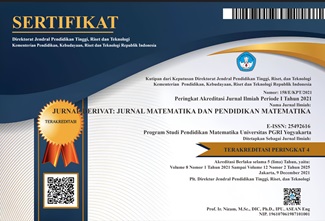Implementasi Model Pembelajaran Creative Problem Solving (CPS) Untuk Meningkatkan Kemampuan Pemecahan Masalah Mahasiswa
DOI:
https://doi.org/10.31316/j.derivat.v5i1.149Abstract
This study aimed to improve students’ problem-solving skills and to describe the implementation of creative problem solving (CPS) model in Mathematics Education students of the Muhammadiyah University of Makassar in its program. This research was a classroom action research which involved 33 students with two cycles (1 cycle was 4 times meeting). The cycling stage consisted of planning, action, observation, reflection. Data collection through observation, test result, and student response were analyzed by quantitative descriptive analysis technique. The research finding was: Implementation of learning model (CPS) can improve students’ problem-solving ability which can be seen from the increasing of solving ability from 63,03 (enough) to 77,72 (high). Effective learning (CPS) implementation with learning implementation indicators improved from less category to excellent category; student activeness increased from active category to highly active category, and student responses were in a very positive category. (2) Implementation of Learning Model (CPS) can be implemented through five stages: clarification of the problem; disclosure of ideas; evaluation; and implementation.
Â
Keyword: Learning Model, Creative Problem Solving (CPS), and Problem Solving Ability.Downloads
Published
Issue
Section
Citation Check
License
Authors who publish with this journal agree to the following terms:
-
Authors retain copyright and grant the journal right of first publication with the work simultaneously licensed under a Creative Commons Attribution-ShareAlike 4.0 International License that allows others to share the work with an acknowledgment of the work's authorship and initial publication in this journal.
- Authors are able to enter into separate, additional contractual arrangements for the non-exclusive distribution of the journal's published version of the work (e.g., post it to an institutional repository or publish it in a book), with an acknowledgment of its initial publication in this journal.
- Authors are permitted and encouraged to post their work online (e.g., in institutional repositories or on their website) prior to and during the submission process, as it can lead to productive exchanges, as well as earlier and greater citation of published work (See The Effect of Open Access).







